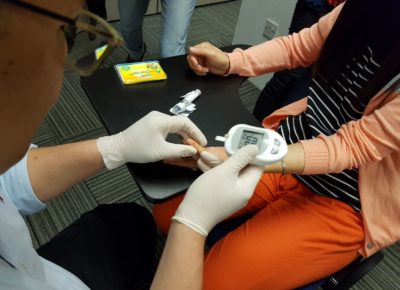Dementia Studies is supporting care that enables individuals and families to live well with dementia.
The University of Stirling is home to the internationally renowned Dementia Services Development Centre (Dementia Studies) which shares contemporary ideas and practices with governments and other academic institutions.

COURSE INFORMATION

The University of Stirling was established in 1967 and is recognised across the globe for excellence in teaching, research, and offering a world-class student experience. Its postgraduate dementia studies program was first proposed in 1999 and was the first of its kind internationally. As the longest-running provider of dementia studies education, it has an international reputation for quality teaching and an international, multidisciplinary community of students and academics committed to improving dementia practice.
Accolades of University of Stirling:
- Ranked 47th in the Times University Guide 2020
- In 2019, won the Queen’s Anniversary Prize for Higher and Further Education.
- Awarded five stars in areas of teaching, employability, internationalisation, facilities, and inclusiveness (The QS World University Rankings)
- 100% of Psychology Impact case studies classed as world-leading (Research Excellence Framework, 2014).
The University of Stirling is the longest-running provider of postgraduate qualifications in Dementia Studies where students learn from an experienced group of world-leading academics, with reliable and established research records. Plus real sector experience and a wealth of world-class publications that will support you both personally and academically.
Via the online learning platform, you will join an international, multidisciplinary community of students and academics passionate about positive changes in Dementia and practice.
This course delivery in Singapore provides additional facilities for reflective studies in a private nursing home, and this nursing home is Dementia friendly, the staff are Dementia trained and has a rehabilitation department that contributes mainly to the activities for the elderly to slow down the progression of Dementia.
As the course is offered part-time via blended learning, you can take this course concurrently with your current work and personal commitments.
The course provides you with an in-depth, research-based knowledge of Dementia. It includes theory, innovative and best practices, policy drivers and initiatives, and a grounding in academic and research skills. You will:
- Develop an advanced understanding of multidisciplinary perspectives about Dementia and approaches to dementia care.
- Address critical issues in dementia care and service delivery
- Encourage improved collaboration across areas of care
- Compare national and international research
- Identify and debate current practice developments
- Develop critical thinking to promote reflective practice
- Develop knowledge and skills of social research processes
There are a total of 9 modules for MSc in Dementia Studies.
Full Time
36 months
Intake Schedules
September Every Year
Course Commencement
Minimum of 20 registered students to commence.
Students will be informed two weeks before the start of class.
University of Stirling Lecturers will fly into Singapore to provide face to face intensive lectures at the beginning of each level of studies. The delivery mode will support reflective practices in an authentic learning environment at the Charis Manor, a dementia-friendly Nursing Home, as well as online learning on the University of Stirling’s established e-learning platform.
There are no examinations, and all modules graded through a range of assessments such as essays, evaluation reports, research proposals, and literature work.
To graduate, a student must complete and pass:
- Nine modules for MSc
- Six modules for PGDip
- Three modules for PGCert
Upon completion, students are awarded by the University of Stirling.
This course will enhance your employability within the broad field of dementia care, enabling you to move to more specialised and promoted posts within health and social care settings.
For professionals already working in the field and carers/volunteers who are supporting people with dementia care, this innovative course has developed to provide you with an in-depth, research-based knowledge of Dementia and approaches to dementia care.
It will impart the transferable skills that enable you to give your expertise to colleagues and other students, transfer awareness, implement action in the community, and provide training to family members and carers.
Why choose Dementia Studies?
The social and economic impact of Dementia in Singapore and throughout the world is increasing year-on-year with our aging population. Dementia and its accompanying woes cost Singapore $1.4 billion every year, making it among the biggest drains on the healthcare system here.
This alarming figure, uncovered for the first time by local and international researchers, underscores the need to prevent the debilitating disease from taking hold in greying Singapore. (Straits Times, May 2, 2016) Therefore, there are increasing research and employment opportunities for dementia care.
This course will enhance your employability within the broad field of dementia care, enabling you to move to more specialised and promoted posts within health and social care settings.
Also, this course encourages collaborative, interdisciplinary, critical, and reflective learning and seeks to produce leaders of change in the field.
For professionals already working in the field and carers/volunteers who are supporting people with dementia care, this innovative course has developed to provide you with an in-depth, research-based knowledge of Dementia and approaches to dementia care.
It will impart the transferable skills that enable you to give your expertise to colleagues and other students, transfer awareness, implement action in the community, and provide training to family members and carers.
Dementia and the environment (A)
This module created was in response to a rapidly growing interest in the social and physical environments inhabited by people with Dementia and their significance for living well. Recent years have witnessed a dramatic restructuring of health and social care, including a steady shift away from institutional forms of care for people with Dementia and towards higher levels of care provided in the person with Dementia’s own home. Such changes have important implications for anyone working in the field of dementia care.
Topics for discussion in the module include ageing and the environment, the importance of place in person-centred care, architecture and design, home and housing, interior and exterior design and the role of outdoor space in supporting people living with Dementia. We will also discuss assistive technology in dementia care and the ethical issues surrounding the use of technology.
Critical and creative approaches to Dementia (B)
This module provides a foundation for the course as a whole and has a focus on two interlocking themes. We begin by exploring different critical perspectives on Dementia and their underlying theoretical context. We consider the various ways in understanding Dementia and approached in fields such as medicine, psychology and the social sciences and examine the implications for dementia care policy and practice. Students are encouraged to make links to their own professional or caring situation and to consider how these different approaches to Dementia might further inform their work.
The relationships they develop with people living with Dementia. In the second part of the module, we turn to consider the role of creativity and the arts in dementia care. The aim here is to demonstrate and explore the diverse ways in which the arts have become embedded in dementia care and the opportunities they offer for supporting and working with people living with Dementia.
Critical and reflecting thinking in dementia studies (C)
This module runs across the first year of the postgraduate programme in dementia studies. The aim is to introduce students to critical and reflective thinking in dementia studies. Students will be able to develop skills in essential reading and writing and enhance their ability to synthesise, reference and cite literature adequately.
They will be encouraged to use these academic practice skills to reflect critically on creative approaches. The online learning community will for this module, as others, be a source for students to discuss ideas, draw on others’ experiences and reflect on their academic practice.
Living with Dementia (D)
In this module, students will look at the experiences of people with Dementia, their carers and families, through the lifespan of the condition from diagnosis to end of life care and death. The module focuses on the lived experiences of people with Dementia and draws on the increasing amount of research literature that engages directly with people with Dementia and their carers.
Through this module, learners will also be encouraged to reflect on the policy frameworks shaping care and considering it with people with different types of Dementia, such as people with learning disabilities and people with alcohol-related Dementia and those with other specific conditions.
Enhancing dementia practice (E)
The module aims to contextualise current practice and to unpack the underlying theories and mechanisms that support good practise in dementia care. The first half of the module considers the frameworks that influence practice, considering legislation and policy as well as ethical and practice guidelines.
These sections look at legislative structures that govern how care and support provided for people with Dementia and their families in the UK and other countries, alongside global approaches to ethical practice encompassing human rights approaches and consideration of risk and advocacy. There follows a short reflection on the workforce, considering who is taking care of people with this disease and what gaps and needs there are in their knowledge and skills.
This critical context for the second half of the module considers how practice enhances and develops through the acquisition and use of new knowledge and evidence and the subsequent sharing of this through transfer and learning. Towards the end of the module, you will be encouraged to consider how you might support change in your organisation – through training and the introduction of new approaches and ideas.
Understanding and evaluating evidence in dementia studies (F)
The module provides students with skills and knowledge that will enable them to evaluate a range of evidence from research and practice effectively and to utilise than this evidence to build a strong knowledge base and improve practice within their workplace. The module focuses on four keys themes:
- evaluating the research evidence
- understanding statistical evidence
- promoting participatory practice and research, and utilising skills in social media to develop training and knowledge networks
Researching quality of life and Dementia: Approaches and methods (G)
This module focuses on the different methodologies and methods used to research the quality of life. Broad methodological approaches to understanding and investigating the concept of quality of life, linking to more comprehensive theoretical frameworks for understanding Dementia. The module explores how different ways of conceptualising quality of life-impacting on the particular ways in which social researchers design their methodological approach, choose appropriate methods and engage people with this disease.
Researching Dementia (H)
This module introduces students to the third year of postgraduate study and provides a foundation for conducting care research. The module introduces theories related to dementia research methodology, methods and analysis, and discusses how such theory can conceptualise within different models of care research. Examining opportunities for research at different scales, and concerning the roles of qualitative and quantitative research methodologies in care research, this module will also encourage students to think about how research impact can be planned for and achieved. The module overall will help prepare students for further masters level study.
Developing a dementia research proposal (I)
This module asks students to write a proposal for a research project in the field of care. The module will guide students in identifying a suitable topic, developing research questions and adopting appropriate data collection and analysis methods. After completing the module, students will further equipped with the research skills necessary to research as part of their professional practice.
YOU WILL BE CONFERRED BY UOS & AWARDED FOR:
- POSTGRADUATE CERTIFICATE IN DEMENTIA STUDIES: MODULES A TO C
- POSTGRADUATE DIPLOMA IN DEMENTIA STUDIES: MODULES A TO F
- MASTER OF SCIENCE IN DEMENTIA STUDIES: MODULES A TO I
A minimum of a Bachelor’s degree or equivalent, preferably in a relevant subject.
Applicants should work in a related field or have a personal experience of caring for people with Dementia.
For students whose first language is not English, a minimum IELTS score of 6.0 and above or equivalent is required.
Local Students
Application Fees
Application Fees are non-refundable and non-transferable.
$300
Course Fees Per Module
The fees required for each module.
$3,300
Full Course Fees
The full fees for 9 Modules
$29,700
- Above amounts are in Singapore Dollars, and are exclusive of GST.
- Application Fees refer to the price that the student pays the school for the sole purpose of processing the application and admission requirements.
- Local Student refers to Singaporean Citizens, Permanent Residents, Employment Pass or Dependant Pass Holders.
- For course fee refunds policy, please refer to the Student Handbook.
Application Fees
Application Fees are non-refundable and non-transferable.
Local Students
$300
Course Fees Per Module
The fees required for each module.
Local Students
$3,300
Full Course Fees
The full fees for 9 Modules
Local Students
$29,700
- Above prices are in Singapore Dollars, and the amounts are before GST.
- Local student refers to Singaporeans, Permanent Residents, Employment Pass or Dependant Pass Holders.
Insurance Fees
- Under Edutrust Certificate Scheme stipulated by Committee for Private Education (CPE), the student’s fee must be protected.
- Serves to protect students’ paid fees.
- Subject to prevailing market rate
Medical Insurance Fee
- Subject to prevailing market rate
- Local and International Students are to purchase medical insurance valid throughout their course of studies with CSM Academy International.
- Local Students (Singaporeans, Permanent Residents & Non-student’s Pass Holders) may opt-out of this scheme if they can provide proof of adequate medical insurance coverage in Singapore.
Payments
- All Payments of fees are in Singapore Dollars.
- Amounts presented above are exclusive of Goods and Services Tax (GST)
Payment Methods
Cheque
Telegraphic Transfer

NETS

PayNow
To begin your application process, please click the Apply Now! button below, or find the application form found on this page.
Documents
Please prepare screenshots, scans, or digital copies of your personal documents as they may be required to be uploaded to the application form, such as your NRIC, Working Pass, Student Pass, Passport, Diploma, Certificate or Transcript of Records (where they apply), etc.
Application Fees
Your application fee for this course must be paid prior to submission of the form. Payment details will appear as you go through with the application form. Application Fees are non-refundable.
After Submission
A representative from CSM Academy International will contact you shortly after submission to assist you further into the application process.
The following documents are required for submission:
- Passport/ Birth Cert/NRIC
- Parchment and transcripts of your Bachelor’s Degree
- English Language Competency Certificates
- Digital Passport-sized Photograph
- Application Fee
- Resume/CV

SEE MORE COURSE OFFERINGS
DISCOVER A BETTER YOU.
Take a leap into one of the most rewarding industries and help change people’s lives. Begin your journey today by applying to any of our world-class courses!


































